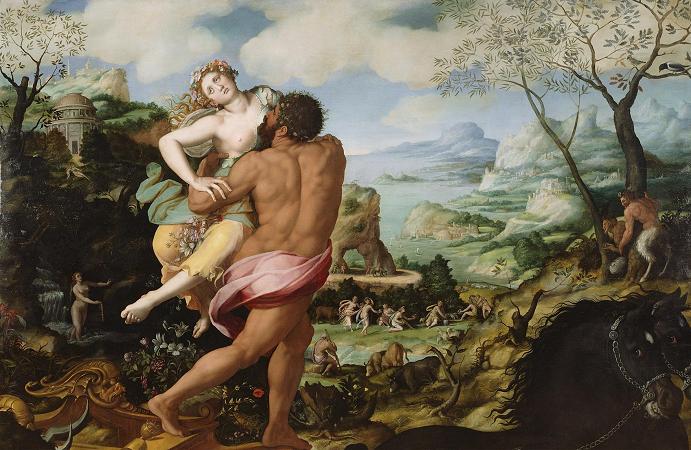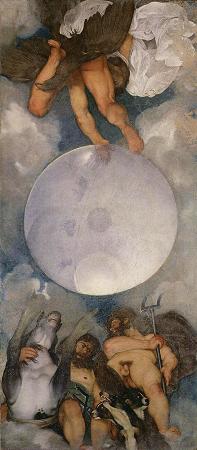Pluto, Hades. Pluto was the ruler of the underworld in classical mythology. The earlier name for the god was Hades, which became more common as the name of the underworld itself. In ancient Greek religion and mythology, Pluto represents a more positive concept of the god who presides over the afterlife. Plouton was frequently conflated with Ploutos, the Greek god of wealth, because mineral wealth was found underground, and because as a chthonic god Pluto ruled the deep earth that contained the seeds necessary for a bountiful harvest. The name Plouton came into widespread usage with the Eleusinian Mysteries, in which Pluto was venerated as both a stern ruler and a loving husband to Persephone. The couple received souls in the afterlife and are invoked together in religious inscriptions, being referred to as Plouton and as Kore respectively. Hades, by contrast, had few temples and religious practices associated with him, and he is portrayed as the dark and violent abductor of Persephone. Pluto and Hades differ in character, but they are not distinct figures and share two dominant myths. In Greek cosmogony, the god received the rule of the underworld in a three-way division of sovereignty over the world, with his brother Zeus ruling the sky and his other brother Poseidon sovereign over the sea. His central narrative in myth is of him abducting Persephone to be his wife and the queen of his realm. Plouton as the name of the ruler of the underworld first appears in Greek literature of the Classical period, in the works of the Athenian playwrights and of the philosopher Plato, who is the major Greek source on its significance. Under the name Pluto, the god appears in other myths in a secondary role, mostly as the possessor of a quest-object, and especially in the descent of Orpheus or other heroes to the underworld. Pluto is the Latinized form of the Greek Plouton. Pluto's Roman equivalent is Dis Pater, whose name is most often taken to mean Rich Father and is perhaps a direct translation of Plouton. Pluto was also identified with the obscure Roman Orcus, like Hades the name of both a god of the underworld and the underworld as a place. The borrowed Greek name Pluto is sometimes used for the ruler of the dead in Latin literature, leading some mythology handbooks to assert misleadingly that Pluto was the Roman counterpart of Hades. Pluto becomes the most common name for the classical ruler of the underworld in subsequent Western literature and other art forms. The name Plouton does not appear in Greek literature of the Archaic period. In Hesiod's Theogony, the six children of Cronus and Rhea are Zeus, Hera, Poseidon, Hades, Demeter, and Hestia. The male children divide the world into three realms. Hades takes Persephone by force from her mother Demeter, with the consent of Zeus. Ploutos, Wealth, appears in the Theogony as the child of Demeter and Iasion: fine Plutus, who goes upon the whole earth and the broad back of the sea, and whoever meets him and comes into his hands, that man he makes rich, and he bestows much wealth upon him. The union of Demeter and Iasion, described also in the Odyssey, took place in a fallow field that had been ploughed three times, in what seems to be a reference to a ritual copulation or sympathetic magic to ensure the earth's fertility. The resemblance of the name Ploutos to Plouton., it has been noted, cannot be accidental. Plouton is lord of the dead, but as Persephone's husband he has serious claims to the powers of fertility. Demeter's son Plutus merges in the narrative tradition with her son-in-law Pluto, redefining the implacable chariot-driver Hades whose horses trample the flowering earth. That the underworld god was associated early on with success in agricultural activity is already evident in Hesiod's Works and Days, line 465-469: Pray to Zeus of the Earth and to pure Demeter to make Demeter's holy grain sound and heavy, when first you begin ploughing, when you hold in your hand the end of the plough-tail and bring down your stick on the backs of the oxen as they draw on the pole-bar by the yoke-straps. Plouton was one of several euphemistic names for Hades, described in the Iliad as the god most hateful to mortals. Plato says that people prefer the name Plouton, giver of wealth, because the name of Hades is fear-provoking. The name was understood as referring to the boundless riches of the earth, both the crops on its surface, he was originally a god of the land, and the mines hidden within it.
more...














